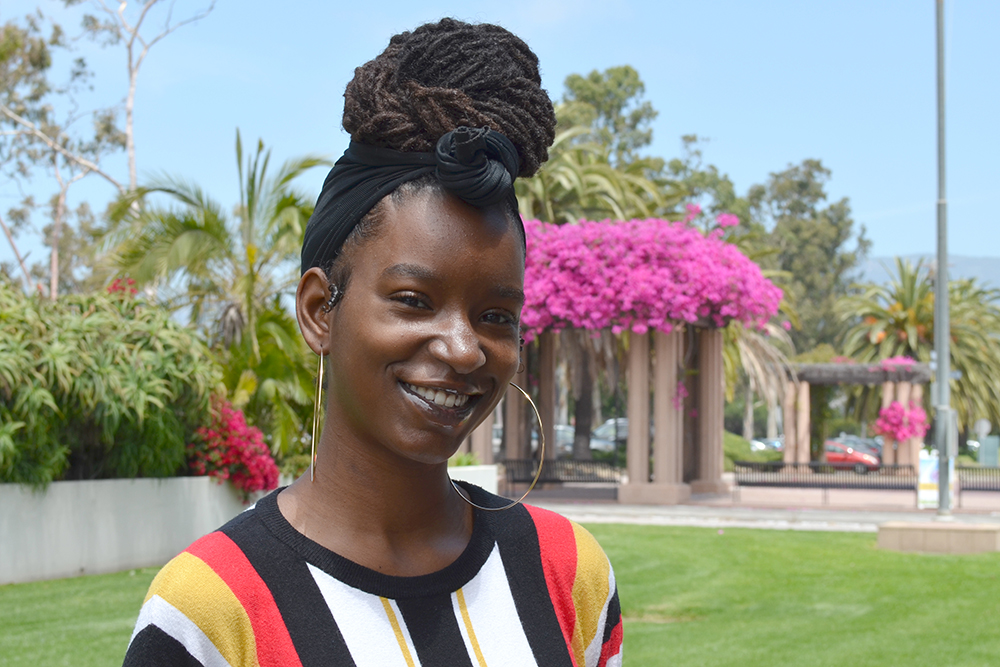
‘A Remarkable Scholar’
For her outstanding scholarship and extraordinary service to the university, Zenzile Saharee Riddick is the recipient of the 2019 Thomas More Storke Award for Excellence, the campus’s highest student honor.
Riddick’s nominators describe her as “a remarkable scholar and an extraordinary human being who has made an impact in multiple ways for students, both at UC Santa Barbara and across the UC system.”
Earning a bachelor’s degree in sociology with a minor in history, Riddick was admitted to UC Santa Barbara as a Promise Scholar, a program that commits four years of financial aid to low-income students who demonstrate great academic promise. She took advantage of every opportunity, becoming a scholar and activist who excelled in academics, conducted original research and worked to create institutional change.
“In my four years at UCSB I’ve committed myself to programs I believed in,” she said, “programs that would ultimately aid in the success of UCSB’s first-generation, low-income, and marginalized student communities.” Among them: the Black Freshman Mentorship Program (also known as OG/YG), the Promise Scholar Summer Program, the FAFSA Completion Project, and the Youth Leadership Council she helped create with the local non-profit organization A Different Point of View.
“I am most proud of receiving the Storke Award because in shining a light on my accomplishments, UCSB is shining a light on these powerful programs and the students that comprise them,” Riddick said. “It’s not just my spotlight, it is OG/YG’s spotlight ... it is a Coalition for the Better UC spotlight. Most importantly, it is a spotlight for all first-generation, low-income, underrepresented students, and all young Black women scholars. This recognition shows them that there are not only student-crafted channels of support on our campus, but that they can absolutely be academically excellent leaders here at UCSB.”
As a McNair Scholar, Riddick engaged in research that involved a comparative study of the criminalization and cultural erasure in colonial mission schools and in United States urban schools. She was invited to present her research on numerous occasions to history classes, at statewide and national conferences. Graduating with a grade-point average of 3.95, Riddick landed on the Dean’s Honor Roll for most of her quarters at UC Santa Barbara and excelled not only in her undergraduate coursework, but also in graduate-level seminars.
Sociology professor Beth Schneider described Riddick as “a lover of research,” who has gone far beyond what is expected and serves as a role model for research. History professor Paul Spickard described a situation that arose in one of his 500-student modern history classes when the discussion turned to racist graffiti. Riddick spoke to the entire class, “holding the floor for 20 minutes,” Spickard said, “with a spontaneous lecture on structural racism and its impact on the individual psyche, the economy and politics. It was a tour de force.”
Beyond her academic achievements, Riddick’s commitment to service and to the campus community led her to become a champion for increasing access and affordability for low-income students of color. She held leadership roles in the Black Student Union and worked with the Office of Admissions to develop the Black Freshman Mentorship Program to improve retention rates among black students. As a Michael D. Young Scholar Intern, she contributed her knowledge and passion for others while working as an intern in the Office of Financial Aid and Scholarships.
As part of her internship she worked on several initiatives, including a re-entry program for students who had dropped out, a campuswide Cal-Fresh program to promote food security resources and the development of strategies and initiatives to improve the low rates of students completing the FAFSA applications. During her sophomore year, Riddick was invited by the UC Regents to give a presentation on access and affordability.
RIddick credits much of her success at UC Santa Barbara to the mentors who helped her along the way. “There were moments of fear and struggle during my UCSB career, and in the times I felt inadequate and unable, my mentors were there,” she said. Those individuals also taught Riddick the importance of paying it forward, so to speak, so others could benefit from her experience and wisdom.
“I have met amazing second- and third-year students and it has been my honor to be considered a mentor to them,” she explained. ”I've watched one of my very first ‘mentees,’ Ebele Veronica Eseka, become a 3.95 honors student, a resident assistant, a Michael D. Young Ingern, a member of the Coalition for Better UC and even a mentor for honors students in the College of Letters and Science. Another mentee who I met during his freshman year is Daevionne Beasley, who has gone on go be a MAC, a resident assistant, a member of the Coalition for a Better UC, a diversity training leader and UCSB’s new executive vice president of student affairs. Both of these students serve as mentors to others.
“That thread of mentorship is what personalizes the student experience and helps each person at UCSB seize their fullest potential,” Riddick continued. “As I enter the next phase of life as a graduate student, I will be certain to see myself first as a mentor to others.”
Next fall, with a U.S. Presidential Scholarship in hand, she will head to Harvard University to pursue a Ph.D. in education. Riddick’s advice to incoming UC Santa Barbara freshman and transfer students? Lead!
“If something needs changing, do not ever underestimate your ability to change it,” she said. “It is your duty, and it is not out of reach. Whatever you are passionate about, you can make a reality.”



